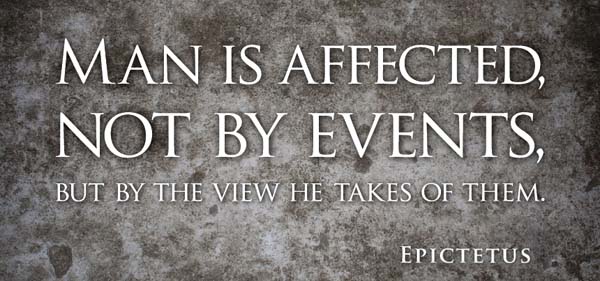Success Advice
7 Transformational Lessons From The Philosophy Of Success
If Addicted2Success was founded in ancient times, the majority of readers would be Stoics. Some of the greatest leaders in history were Stoics—Cicero, Epictetus, Seneca, Marcus Aurelius. Stoicism goes hand-in-hand with success because of its emphasis on self-mastery.
The key to happiness and a fulfilled life was found in responding—not reacting to external world circumstances. Stoics taught although we can’t control what happens to us in life, we can certainly control our response. Responding requires being mindful, aware, and in charge of your emotions and behaviours.
In any event, we can choose to perceive it in a productive way, or a destructive way. Stoics chose to see the glass always half-full.
Whatever philosophy is driving your life, these 7 lessons from Stoicism will no doubt bring positive change to your life.
1. Think About Thinking
Stoicism taught a clear distinction between your thoughts and your behaviour. It’s that old adage, think before you act. The mindless person acts without thinking. The ability to pause, and assess a situation before responding is crucial—and the sign of a healthy Stoic mind.
Marcus Aurelius said, “If you are distressed by anything external, the pain is not due to the thing itself, but to your estimate of it; and this you have the power to revoke at any moment.”
Only a healthy attentive mind can filter and revoke unhealthy thoughts, and ultimately, unhealthy behaviours.
The next time you encounter something unexpected, pause for a moment—ask yourself, What just happened? How am I going to respond? Create a break between your thoughts and your actions.
2. New Day, New Beginnings
“Begin at once to live, and count each separate day as a separate life.” — Seneca
Stoics saw each day brimming with exciting opportunities. Remember, it only takes a single event, a single conversation, to completely change the trajectory of your life.
On the other hand, an awful day doesn’t have to be an awful week. What’s done is done, there’s no point in crying over spilt milk. The Stoics taught a form of mental compartmentalisation—not only to see the whole, but also to see the pieces that make up the whole; to put things in a box and take out the trash when needed.
A new day, a clean slate.
3. Purposed Action
“If a person doesn’t know to which port they sail, no wind is favourable.” — Seneca
The Stoic wakes up and knows exactly what they want out of their day. They have a clear destination and clear goals. The emphasis wasn’t only on human action and being busy, but being productive. There’s a big difference between the two. You can be busy and get things done, but none of those things may bring you closer to your goal.
You can sail all day, and end up right where you started. Know your port—your destination—and make sure your actions are steered toward that point.
4. You’re Already There
We’e got it all backward. Almost everyone will agree achievement and success brings happiness. Wrong. It’s happiness that brings success:
“True happiness is to enjoy the present, without anxious dependence upon the future, not to amuse ourselves with either hopes or fears but to rest satisfied with what we have, which is sufficient. The greatest blessings of mankind are within us and within our reach. A wise man is content with his lot, whatever it may be, without wishing for what he has not.” — Seneca
What the Stoics knew for centuries, science has recently clued into. Harvard Psychologist Shawn Achor shared his research during a Ted Talk—professionals from various careers who took part in a gratitude practice at the start of their day performed at a much better level than those who didn’t do the gratitude exercises. Achor showed that starting with a positive mindset yields greater results than starting at neutral.
Happiness should never come at the finish-line of anything, but rather as the starting block.
5. Follow The Natural Flow
“No great thing is created suddenly, any more than a bunch of grapes or a fig. If you tell me that you desire a fig, I answer you that there must be time. Let it first blossom, then bear fruit, then ripen. – Epictetus
Ambitious people live ten years in the future. We’re never where we want to be, and patience isn’t our strongest virtue. Stoicism not only taught living according to our inner flow, but also to the external flow of life.
Everything has it’s season—we can’t expect to be harvesting in Winter. And we all know it takes 10-years to become an overnight success.
Constantly trying to find shortcuts will send you round in circles. Just like a great movie, follow the storyline, rather than walking in mid-way.
6. Authenticity
“Were I a nightingale, I would act the part of a nightingale; were I a swan, the part of a swan.” – Epictetus
It’s so important to have mentors and role-models. But emulation can easily turn into imitation, and all you become is a second-rate product. Another foundation in Stocism is the perfect balance between fate and free will.
It’s a mysterious paradox—having the power to change everything, yet being powerless to change anything. The leopard can’t change it’s spots, but at the same time, you can always teach an old dog new tricks.
Practically, it means embracing your unchangeable quirks and leveraging your uniqueness. Figure out what your gifts and talents are, and exploit them. Seek change in order to grow into the best version of you, not so you become more like someone else.
7. Make Peace With Death
“Rehearse death. To say this is to tell a person to rehearse his freedom. A person who has learned how to die has unlearned how to be a slave.” – Seneca
Not something we like to talk about, but if there’s one thing we all have in common, it’s the certainty of death. Whether we realise it or not, death is at the root of all our fears. Our fight/flight mechanisms work to preserve life, to flee from death. But it often gets triggered way before death even enters into the picture—and cripples us from doing what we’re passionate, but afraid of.
The fear of death is the greatest form of slavery. Stoicism encouraged seeing death as a natural part of life, to stare death in the face, see it as normal, and be released from it’s fear.
Steve Jobs said it beautifully, “Remembering that you are going to die is the best way I know to avoid the trap of thinking you have something to lose. You are already naked. There is no reason not to follow your heart.”
Success Advice
The Modern Blueprint for Success: Mastery, Purpose, and High-Income Skills
If your current path feels empty, maybe it’s time to aim for something more meaningful
Success Advice
The 70-Year-Old Management Strategy That’s More Relevant Than Ever
It emphasizes setting clear, measurable goals that align employee efforts with broader company objectives

Every organization has its own vision and mission. But a vision is only as powerful as the people behind it. When employees are actively involved in decision-making and goal-setting, that vision becomes a shared reality. (more…)
Explode Your Social Media
Want More Views? Master These 6 YouTube Growth Tactics
Getting a strong start or feeling stagnant are two completely different problems, but they both need momentum, viewer engagement, and growth to fix them.

Strategic planning combined with unwavering dedication allows you to rise above the chaos of YouTube—luck won’t get you anywhere. (more…)
Change Your Mindset
The Leadership Skill Nobody Talks About (But Changes Everything)
Curiosity often takes a back seat to certainty and gets labeled as a soft skill, which makes it sound obvious and easy

Most of us, when faced with challenges, instinctively seek certainty and answers. In turn, our ego steps in and prompts us to defend our views, double down, or perhaps disengage. (more…)
-

 Success Advice4 weeks ago
Success Advice4 weeks agoThe One Mindset Shift That Made Me Irreplaceable At Work
-

 Did You Know3 weeks ago
Did You Know3 weeks ago7 Surprising Life Lessons Video Games Taught Me That School Never Did
-

 Success Advice4 weeks ago
Success Advice4 weeks agoHow Playing by the Rules Became the Smartest Business Strategy
-

 Success Advice3 weeks ago
Success Advice3 weeks agoHow to Build Trust, Kill Micromanagement, and Lead a Team That Thrives
-

 Scale Your Business3 weeks ago
Scale Your Business3 weeks agoHow to Build a Workplace People Actually Want to Show Up To
-

 Success Advice3 weeks ago
Success Advice3 weeks agoSuccess Isn’t Sexy: 5 Daily Habits That Actually Work
-

 Scale Your Business3 weeks ago
Scale Your Business3 weeks agoHow Smart Entrepreneurs Cut Financial Chaos in Half with One Simple Switch
-

 Success Advice2 weeks ago
Success Advice2 weeks agoBreaking the Bias: How Females Can Thrive In The Workplace in 2025
































8 Comments